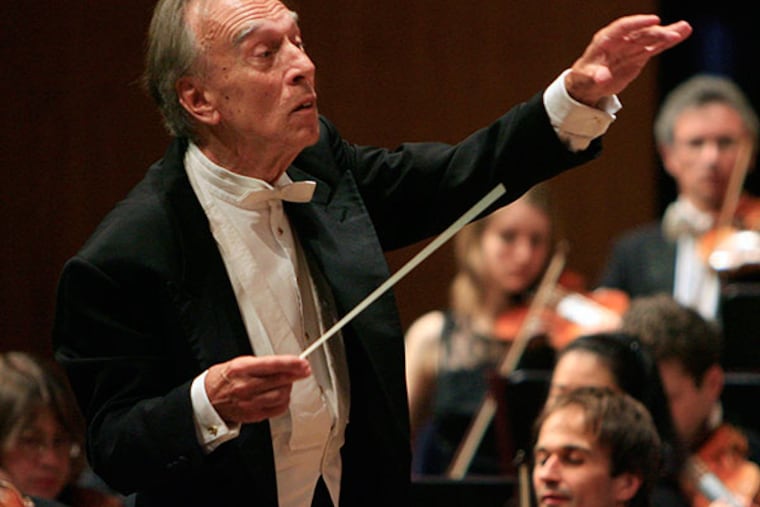Claudio Abbado remembered: Hard-won, effortless mastery
No matter how much conductor Claudio Abbado was idolized as the grand old man of the orchestral world, no matter how deep his performances of Bruckner symphonies before his death Monday at 80, he maintained an elegant, sometimes opaque, veneer.

No matter how much conductor Claudio Abbado was idolized as the grand old man of the orchestral world, no matter how deep his performances of Bruckner symphonies before his death Monday at 80, he maintained an elegant, sometimes opaque, veneer.
After a long Bruckner symphony, Abbado was seen on camera, assiduously composing himself and assuming his public face before taking an aristocratic bow. The public wouldn't guess what it took to do what he did.
In recent years, those bows often included buckets of flower petals tossed on him and the Lucerne Festival Orchestra by audiences that couldn't stop expressing affection for what he had wrought. How much Abbado enjoyed this was hard to tell. He was like that.
"There was almost an abrupt change of personality," recalled Philadelphia Orchestra violinist Davyd Booth, who played numerous concerts when Abbado guest-conducted from 1968 to 1977. "He was a gentleman to work with, a wonderful musician, and had one of the four or five most impressive memories I've ever encountered. He conducted almost everything from memory. In rehearsal, he was low-key. In performances, he'd come to life."
If pianist Yuja Wang was hoping for some guru-like encounter during her concerto collaborations with Abbado, she instead met an Old-World Italian patriarch, "always asking about your family," she recalled. Then, when it came to performances with his Lucerne Festival Orchestra, she described being hit with a wall of orchestral sound that nearly knocked her off her bench.
A sphinx with a smile? So it often seemed. In retrospect, one could speculate that, the more troubled that matters were backstage, the more deflective the smile became. During a 1990s interview with him, I found him as congenial as could be, but he seemed determined to not say anything of substance. I later learned that not all was well between him and the Berlin Philharmonic Orchestra, the appointment he held throughout the 1990s. It should have been the summit of his career, but, until his final seasons there, was more like the apotheosis of polish.
A few hints of the private Abbado sneaked through. During his Chicago recording sessions with the mercurial pianist Ivo Pogorelich, he vowed that he would just hold up his arms and wait as long as was necessary for the pianist to ruminate his way through his cadenza. In recent years, though, disagreements over Mozart concerto cadenzas between Abbado and pianist Hélène Grimaud led to a complete breakdown of the collaboration.
Starting with Abbado's rise to fame in the early 1970s, he was a musical consolidator, the conductor who would draw all elements of a piece or performance into a middle-of-the-road presentation that was the best of its kind, whether of Mahler symphonies or operas by Rossini and Verdi. Especially in the early years of digital recording, Abbado's discs, over the long term, wore the best.
After all, he worked with the best. He was music director of La Scala (1968-1986), the Vienna State Opera (1986-1991), principal conductor of the London Symphony Orchestra (1979-1988), principal guest of the Chicago Symphony Orchestra (1982- 1986), and he succeeded Herbert von Karajan at the Berlin Philharmonic Orchestra (1989-2002). In Philadelphia and Chicago, he was perceived as an heir apparent to longtime music directors who didn't step down before other opportunities arose.
Particularly with complicated scores, Abbado revealed intricacies with lyricism and grace. His Schoenberg looked backward to Brahms rather than forward to Boulez. He could smooth over too many rough edges: His Salzburg outing with Janácek's Dostoevsky-based prison opera, From the House of the Dead, took the bite out of the music in ways that subverted its basic personality.
The Abbado veneer became much thinner after he was diagnosed in 2000 with stomach cancer. After recovery, his appearance was shocking: The perpetually handsome conductor had aged dramatically. So had his performances - in the best possible way. The Berlin slickness - which in some quarters was considered emblematic of the blandness of classical CDs in the 1990s - was gone.
From then on, during his years with the Lucerne Festival Orchestra (starting in 2003), the classical world hung on every note, each performance an experience like no other. His Mahler Symphony No. 3 had all of the exterior cleanness of classic Abbado, but captured the music's pungent savagery as never before.
Walking into his 2011 Lucerne performance of the Bruckner Symphony No. 5, I could be talked into believing the then-tanned, healthy Abbado somehow cast a spell over the musicians and created greatness. Not true. That Bruckner Fifth, the first in a string of performances, indeed, had its rough patches. Abbado's interpretive intentions weren't always clear. That was when I truly came to trust him. Abbado wasn't God. He was a musician who labored long to achieve apparent effortlessness.